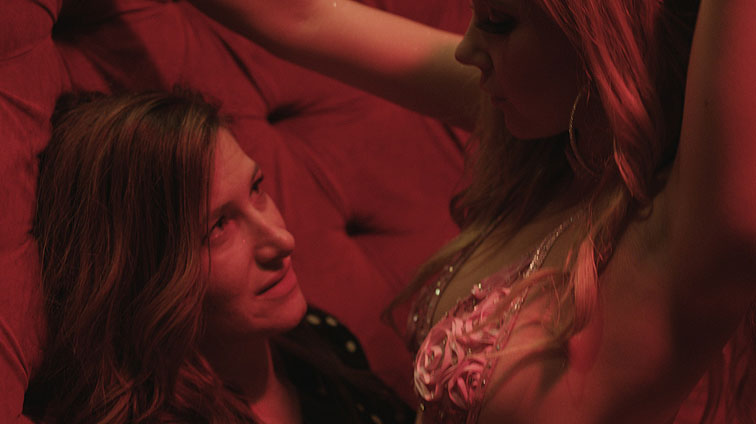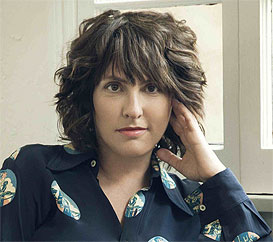
Guided by Voices
Jill Soloway lets her characters guide her in the writing of her directorial debut feature Afternoon Delight, an offbeat hipster comedy with a surprising psychosexual twist.
 Jill Soloway
Jill Soloway
I'd wake up either in the middle of the night when it feels like the rest of the world is sleeping where I can just channel the dialogue of the characters who basically just kind of tell me what they want. I just hear them talking.
If Hollywood is like high school, then writer-director Jill Soloway sits with the cool kids at lunch but is down with the geeks, too. She's written and EP'ed edgy, acclaimed shows like Six Feet Under and the Diablo Cody-conceived United States of Tara, founded the Sit 'n Spin readings at the Comedy Central Stage at the Hudson Theater in Hollywood, and is fluent in the language of the hipster riche Eastside crowd the Intelligentsia-drinking, quinoa-eating 70s kids who grew up to actually kinda run stuff.
Her feature film debut as both writer and director is called Afternoon Delight, and it's set in the Beverly Hills East of Silver Lake, which she captures with pitch-perfect characterizations and a boho-as-it-gets mise-en-scene. The film's perfectly indie cast includes Kathryn Hahn, Juno Temple, Josh Radnor and a truly tailor-made turn by Jane Lynch as an Eastside therapist.
But as spot-on a cool kid as Soloway is, there is something else going on with Afternoon Delight and her. The film takes a deep and surprising turn into what she calls psychosexual comedy. It's the story of a disenchanted stay-at-home hipster mom (Hahn) worn thin by an arid sex life and endless catty school fundraisers and clubs. So she takes in a young stripper (Temple) as a kind of nanny rescue and things get dramatically more complicated and carnal.
It's hard to say if this is the calculated play of someone so savvy she understands she has to do something bold to make a mark as a fresh new filmmaker, or whether it's just a bold, original voice that can't help itself or a little of both.
Either way, it works.
Soloway spoke with the Writers Guild of America West website about writing features versus television, how she is guided by the voices of her characters when she writes, and why she likes naps but ones longer than 20 minutes are utter suicide.
I don't mean this badly but having just interviewed Judd Apatow for This is 40, this film feels like it could be kind of a sister film to it. Is that a good thing or bad thing?
Judd Apatow is a master. I'm always complimented when I'm compared with him, so yeah, that's great. I take that as a huge compliment.
What do you feel the story is about for you?
When you get into the second half of the movie you'll see that it's less about a couple trying to find their spark and I mean it ends up sort of going there but it's more about a woman who is seeking wholeness. This is 40 was sort of a coming-of-middle age comedy about finding out what matters. Afternoon Delight has got a sort of psychosexual comedic There are these psychosexual dramas out there in the world, [but] I don't think anybody's ever made a psychosexual comedy.
No, they haven't, I don't think.
I feel like the movie goes off in directions that are a little more emotionally and psychologically dangerous.
When you're writing a feature, which is obviously a really different experience than a TV show, what's your routine?
They're actually kind of the same to me. I mean, you don't have a writers' room. When I'm writing, I'd wake up either in the middle of the night, like at three in the morning because I can't sleep, or at six in the morning and just spend a few hours when it feels like the rest of the world is sleeping where I can just channel the dialogue of the characters who basically just kind of tell me what they want. I just hear them talking. I'm trying to sleep, and I hear them talking so I have to get up and make sure they get to say what they want to say. And it's like super receptive, 100 percent just kind of court stenographer is my writing style.
So you let the voices guide you. You hear them, and you take it down.
Yeah, I mean I set up problems that the voices can solve. So I'll go to bed thinking very specifically, Wow, this scene is very inactive. I don't know what this person wants. These people just kind of sit there in this scene, I wish they did more. I'll set myself a problem like that before I go to bed and then wake up hearing them do what I asked.
So I don't just let them guide, I kind of give my mind assignments that are formed during the day. I'll have a conversation with somebody, whether it's a network or whether it's a producer or a friend who's given me notes or it's an actor, and I'll have a scene in my head or a moment in my head or a problem in my head, and I'll know that something needs to be solved with a sort of different part of my brain and then I'll let my unconscious provide the answer.
A lot of screenwriters talk about walking, driving, basically time away from the actual writing is when they get their answers for stuff, but for you it's kind of
Walking, driving
Walking, driving, and sleeping
Falling asleep, and it's especially waking up from sleep. Sometimes I'll just lie down and try to take a nap, and then the idea comes It really is about just getting the conscious mind to move away so you can hear the unconscious.
Don't you ever wake up in a really bad mood though when you take a nap, or are you a good napper?
If I take too long of a nap in the afternoons I wake up feeling like the world is going to end, and I'm going to murder somebody, and [I'm under] the most giant existential, 1000 pound blanket of death. But that's if you nap for 50 minutes. If you nap for 20 it's okay.
Yes! Completely agree. But are you telling me on like United States of Tara, obviously Six Feet Under, your routine wasn't that different with writers' rooms?
Obviously, there were writers' rooms, but it was the same process for me because writing is something I do when I'm alone, and it's between me and my computer, but solving problems happens in a group with a whiteboard. And, you know, you don't have your writers on a movie, but you do have your producers, you do have friends, investors other people will bring in reasons why you need to think about rewriting, your cinematographer, your location scout. Then you start casting, and that triggers rewrites, you can now hear the voice of the character in an actor's voice. So I'm always rewriting, it's always alive. It's alive when I'm conceiving it, when I'm writing it, then when I'm directing it, editing it. I'm always wanting to rewrite and [be] open to rewrite.
You're always listening for cues and input and stuff that helps shape the writing.
Yeah. Even today I was going over how a scene was going to be shot with my cinematographer, and I was, What are the shots, how are we going to shoot this, what are we seeing? And then I was realizing, Oh my god, this phone needs to ring at this moment, not at that moment. I'm always getting closer and closer to the experience of watching it from the audience point of view.
I think more of rewriting now and less of writing, more about how do I make it easier to edit? How do I make it easier to shoot, how do I make it easier to direct? I have to get rid of stuff that is superfluous and is going to waste our time on the day. In the past I would have just left something in because I would have been so entertained by my joke. Now I can look at it and go, Well, this is just going to waste direction's time because they're going to figure out how to shoot the second half of this scene, and they're never going to need it.
Are you concerned at all that your consciousness of all these other elements of the process and efficiencies in the process will have any kind of negative, over-editing effect on your writing?
No, I use a different part of my brain to write. I have a very good relationship between my writer and my director. The writer still likes to do her thing and just go off, have fun and then when it comes time to envision it
The United States of Jill.
Yeah, exactly.
So you founded the Sit n Spin reading group?
Yeah.
Is that still going on?
Yes, every other Thursday at the Comedy Central Stage at the Hudson Theater in Hollywood.
Tell me what, if anything I don't want to assume anything that does for you from a writing standpoint.
Well, I actually haven't been in a while because I've been a little bit crazy [but] that experience allowed me to trust myself and to find my voice and to be able to recognize what was and wasn't a joke. I'd been a TV writer so I'd been writing for other people and, as a sitcom writer, you're kind of wondering if the actor can get the joke right. When I was able to stand up there and read my own work I was able to hear the voice of my comedy in a way that would let me be a lot more confident about what was funny and what wasn't. I would have learned the rhythm of my voice out loud.
How much during your gestation as a writer have you studied, digested, and consumed the writing of people that you admire, people that speak to you to develop your own voice?
I grew up watching Woody Allen and Albert Brooks and James Brooks, Mel Brooks, the three Brooks (laughs).
The Brooks Brothers.
Brooks and Brooks. All those three Brookses and Woody Allen and just wanting to be like those people. I mean the fact that this trailer was playing before Blue Jasmine, it's an overwhelming notion to me that somebody would be going to see a Woody Allen movie and would see my trailer. I just can't You know, he's a god to me . So it wasn't necessarily reading about the techniques of other writers but just wanting to emulate certain people.
In terms of their
Christopher Guest is a hero to me . Spike Lee. I love people who use improvisation.
There are some great improvisational moments in the film. I don't know if they are improvisational. For example, Jane Lynch it's such a benign line but when she says, "I brought quinoa from home."
I know, it's so funny. Because I knew her and I knew exactly how she would say that. No, I mean yeah, she didn't improvise that.
Well, kudos to you because that somehow puts a dagger through the heart of the entire Eastside right now. In the best way, you know what I mean?
Yeah. Quinoa, in her own special Tupperware. It's not just quinoa, it's not quinoa from a restaurant. It's quinoa from home.
© 2013 Writers Guild of America West
